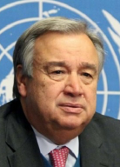|
700 Youths at U.N. Climate Summit
September 21, 2019
Swedish teen Greta Thunberg was probably the most well-known young person to attend the first-ever United Nations Youth Climate Summit, but she was by no means the only one. More than 700 youths from across the world attended the one-day session, punctuated by a meeting with U.N. Secretary-General Antonio Guterres. Thunberg spoke briefly on Saturday but preferred to let others get a chance to address the U.N. The teens who spoke didn't hold back. Bruno Rodriguez of Argentina called for countries to remove themselves from entanglements with big corporations that specialize in fossil fuel production. Komal Karisham Kumar of Fiji warned that if world leaders didn't live up to the promises that they made in signing the Paris Climate Agreement, they would face the consequences at the ballot box. Guterres, who has championed action to combat climate change, welcomed such strong messages. The one-day youth summit came just a day after another worldwide ClimateStrike, which drew 4 million protesters in more than 150 countries. It wasn't all speeches to listeners. Other sessions involved brainstorming solutions. Young people had center stage there as well.
For his part, Guterres has made some significant demands of world leaders and business owners as well:

Guterres has been outspoken in his desire to see the nations of the world take action to forestall further climate change. A year ago, at the 73rd General Assembly, he took the G-20 to task for not setting an example in cutting emissions. The world's 20 leading and emerging economies produce about 80 percent of global greenhouse gas emissions, he said. A target set in the 2015 Paris Agreement was to keep global warming below an increase of 1.5 degrees Celsius (2.7 degrees Fahrenheit). That goal is not achievable unless hard choices are made, Guterres said. Two weeks after that U.N. conference, the Intergovernmental Panel on Climate Change (IPCC) issued a report that found that Earth is already two-thirds of the way along a perilous path of global warming and that if serious action isn't taken by 2030, then the effects could irreversible. Global temperatures have already warmed about 1 degree Celsius. The clearly spelled out goal of the Paris Agreement was to limit such a rise in temperature to 1.5 degrees Celsius by 2050. Unchecked, at the current rate, global temperatures will reach that level by 2040, the scientists said. Further, a month later, the United Nations Environment Programme issued a report that found that greenhouse gas emissions were still on the rise worldwide. In the wake of all of that, Guterres summoned the world's leaders for a special meeting focusing solely on climate action. Some international companies have already pledged large sums of money to efforts to combat climate change. Guterres and other activists hope that leaders of the world's largest countries will do the same. The U.N. has given the public access to its 2020 Climate Progress Tracker. Viewers can access information detailed by businesses, sectors, cities, and nations. The daylong Climate Action Summit will challenge the world's leaders to address concerns that are becoming ever more urgent. A report released on the eve of the summit, from the group United in Science, concludes that current efforts to cut greenhouse gas emissions must increase at lease threefold. If what is already committed to doesn't change, the group found, then average global temperatures will rise by up to 3.4 degrees Celsius by 2100. Already, the study found, the years 2015–2019 are expected to be an average of 1.1 degrees Celsius hotter than pre-industrial times. Coordinating the report was the World Meteorological Organisation, which cited record-breaking heatwaves, wildfires, and glacial melt as examples of results of global warming. |
Social Studies for Kids |
Social Studies for Kids
copyright 2002–2024
David White




 He has called for a end to funding and construction of coal facilities, starting in 2010.
He has called for a end to funding and construction of coal facilities, starting in 2010.
